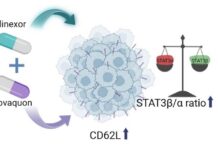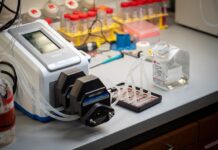New research has revealed a promising approach for the early diagnosis of Alzheimer’s disease (AD) through the analysis of blood biomarkers, which could potentially lessen the impact of dementia.
Alzheimer’s, the most prevalent form of dementia, represents 60-70% of cases globally, equating to over 33 million people, according to the World Health Organization. It remains incurable and is typically diagnosed only after significant memory and cognitive impairments affect daily life.
A team led by Dr. Brandon Mahan from the University of Melbourne’s Faculty of Science, in collaboration with neuroscientists from the Faculty of Medicine, Dentistry, and Health Sciences at The Florey, has developed a novel blood test for early AD detection. Their findings, published in *Metallomics*, present a groundbreaking method utilizing inorganic geochemistry techniques originally designed for cosmochemistry, such as studying planetary samples.
The researchers analyzed potassium isotope levels in 20 blood samples—10 from healthy individuals and 10 from AD patients—using data from the Australian Imaging, Biomarker, and Lifestyle study.
“Our minimally invasive test measures potassium isotopes in blood serum, which may allow for the detection of AD before cognitive symptoms emerge, facilitating earlier intervention,” explained Dr. Mahan, Senior Lecturer at the University of Melbourne.
Unlike traditional protein-based diagnostics that can degrade over time, this potassium-based test offers a stable alternative by focusing on inorganic biomarkers.
Current AD diagnosis involves a combination of medical history, neurological exams, cognitive and behavioral assessments, brain imaging, and protein analysis from cerebrospinal fluid or blood. An earlier diagnosis, Dr. Mahan noted, would enable timely lifestyle changes and treatments to slow disease progression, giving families more time to address the social, emotional, and financial challenges of dementia. It could also increase eligibility for clinical trials, enhancing research and potential treatment options.
As reported by news-medical.net, Professor Ashley Bush from The Florey, a co-author of the study, emphasized the potential of the pilot results: “Our blood test demonstrated strong diagnostic potential and could rival leading blood tests for AD diagnosis. However, additional research is needed to fully assess this method’s effectiveness.”
As the global population ages, the incidence of Alzheimer’s is expected to rise significantly, with dementia cases predicted to double every 20 years. The global cost of dementia could reach $2.8 trillion by 2030. In 2024, over 421,000 Australians are projected to live with dementia, which is the second leading cause of death in Australia and the leading cause among Australian women.
























